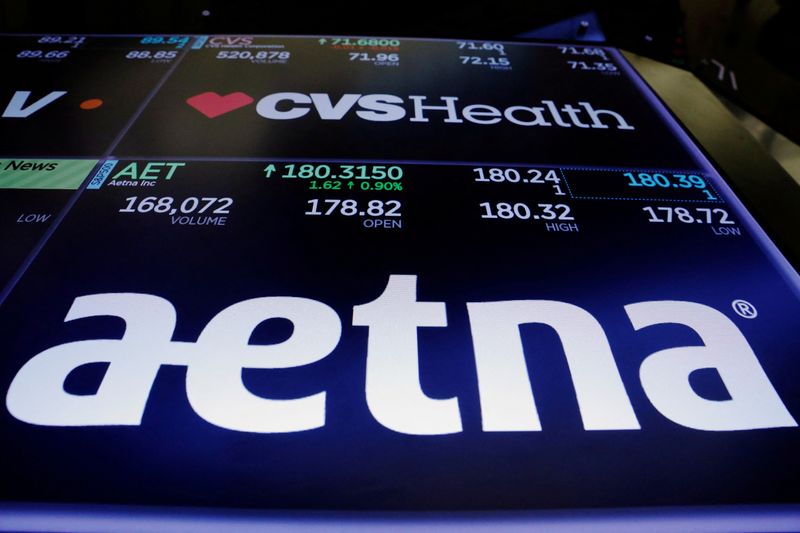By Amina Niasse
NEW YORK (Reuters) - As CVS Health (NYSE:CVS)'s new CEO David Joyner steps into the top job after Karen Lynch's quick departure on Friday, Wall Street analysts and some investors are questioning whether he has the right experience to turn around the Aetna health insurance business as it struggles with high medical costs.
Joyner, who headed the company's Caremark pharmacy benefit management business since 2023, took over on Friday after being named to the job by the board of directors on Wednesday. In addition to Aetna and the PBM business, CVS has a large namesake retail pharmacy chain. Each division accounts for about one-third of the company.
The change at the top, announced alongside news that CVS was withdrawing its 2024 earnings forecast and that third-quarter profit was going to be far below analysts' estimates, pushed shares down 5% on Friday.
The company is under pressure from investors, including activist Glenview Capital, to bring up the price of shares, which are down 24% in a year of record highs for the broader market and are nearly half of CVS's 2022 highs.
Andrew Mok, a senior analyst at Barclays, said a leadership change "was largely expected given recent missteps." But he noted that Joyner's background does not feature health insurance or public company CEO experience, and pointed to "a leadership gap at Aetna that will likely need to be addressed near term."
Four other analysts and investors also questioned Joyner's ability to turn around Aetna, which has struggled to rein in medical services costs affecting its Medicare Advantage insurance for people aged 65 and older. Its problems echo that of rivals in the same business, but are more pronounced.
Executive Chairman Roger Farah said in a joint interview with Joyner that the board had been unanimous in selecting its new CEO, describing the succession planning as "very thorough."
"Lots of thought went into this, lots of conversation," he added.
In the interview, Joyner said he has the experience needed for the job and that he has already begun working to address the challenges confronting Aetna while in his previous role as a top executive at the company.
He plans to hire his own management team, including to run Aetna, which had been overseen by Lynch after the previous leader, Brian Kane, left two months ago.
Joyner pointed to his business initiatives including creating a new type of drug coverage for health plan customers and a new strategy for offering near copies of pricey biologic drugs.
CHALLENGES AHEAD
Health insurance companies typically aim to pay out about 80% of the premiums they collect for customer medical services. CVS said on Friday that the percentage of premiums spent on medical services had risen to 95%.
That's a concern for investors like James Harlow, senior vice president at Novare Capital Management, which holds CVS shares. "I'm just not connecting the dots in terms of how Joyner coming in as CEO is going to solve those issues," he said.
The move to appoint Joyner was largely a response to investors wanting a CEO change, according to Michael Ha, an analyst at Baird.
Not all analysts were skeptical of the move.
Joyner is remembered for turning around Caremark's business in the early 2000s, said Lisa Gill, an analyst at J.P. Morgan.
"David’s direct management style and candor will be hugely valuable," Gill said.
CVS said on Friday it had completed a strategic review and would sell non-core assets as well as close 271 retail pharmacies. Reuters had previously reported that it was considering splitting up pharmacy and insurance.

In the interview, Farah addressed the potential for a breakup.
"There were some questions about whether or not the pieces or parts stick together," he said, "and I think our ongoing conclusion has been that it does and we just need to execute better."
